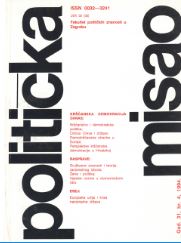Pitanje demokracije u socijalnim dokumentima Crkve
Democracy in the Ecclesiastical Social Documents
Author(s): Stjepan BalobanSubject(s): Christian Theology and Religion, Government/Political systems, Politics and religion
Published by: Fakultet političkih znanosti u Zagrebu
Keywords: Christianity; church; democracy; ecclesiastical social documents;
Summary/Abstract: The author outlines a historical review of the Church’s attitude towards democracy. The initial stance, as formulated by pope Leo XIII at the end of the 19th century, was based on the equidistance of the Church from various political regimes, on condition they respect individual rights, family and the Church. The term Christian democracy primarily denoted a drift within the ranks of the clergy whose goal was helping people and proselytizing under the new circumstances. Further confluence between the Church and democracy occurred during the papacy of Pio XII who emphasized the importance of the political involvement of a free and responsible individual in a democracy and who endorsed the concept of a people as opposed to anonymous masses. The complete acceptance of democracy by the Church occurred during the II Vatical Council (1962—1965) when it gave its blessing to the involvement of Christian laity in the roles of religious and political activists. The latest convergence of the Church and democracy was embodied in the encyclical Centesimus annus by John Paul II (1991) in which the demise of communism is attributed to the lack of democracy and in which democracy is singled out as the best form of government.
Journal: Politička Misao
- Issue Year: XXXI/1994
- Issue No: 04
- Page Range: 31-38
- Page Count: 8
- Language: Croatian

